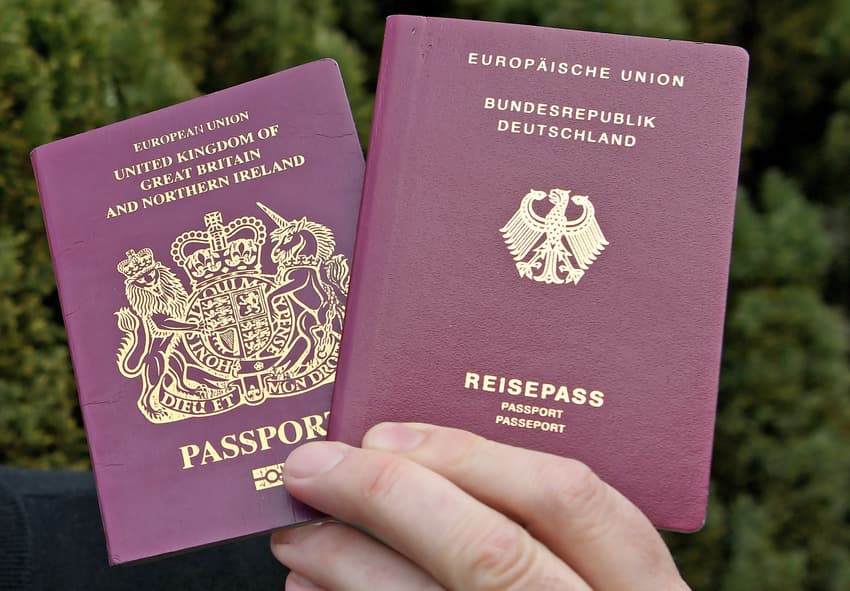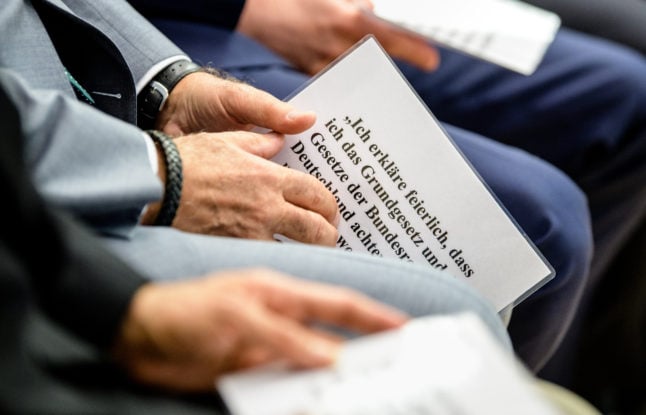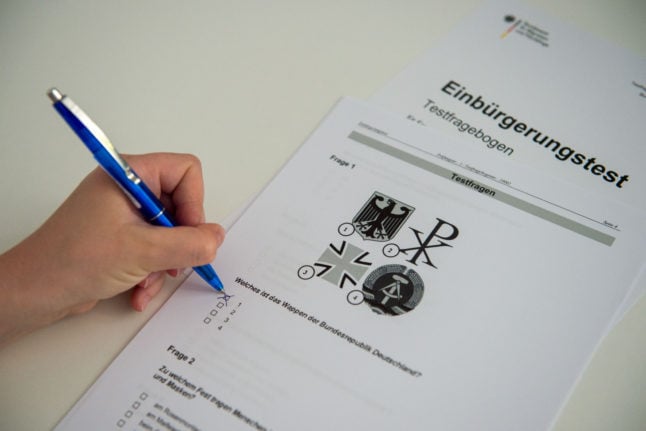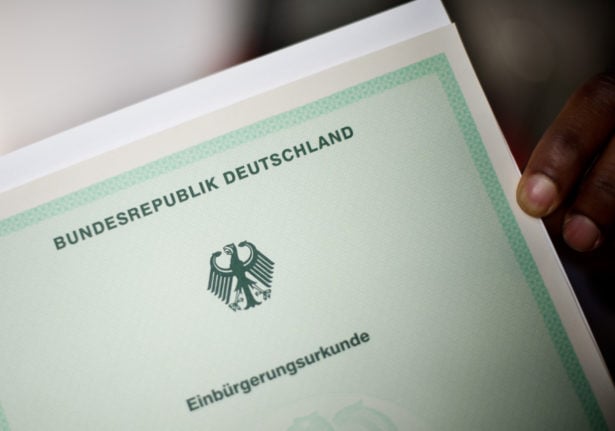INTERVIEW: 'Changing German citizenship laws is a priority'

Germany's new coalition government is planning major reforms of the country's citizenship policies. The Local spoke to the FDP's immigration policy expert Dr. Ann-Veruschka Jurisch about when - and how - people can expect the rules to change.
For several years - if not decades - citizenship has been an area in German politics where very little has been allowed to change.
Though the Social Democrats (SPD) governed for years as the junior coalition partner of the conservative CDU and CSU parties, they were generally blocked at every turn when trying to offer more routes to citizenship.
Instead, the country kept strict rules banning dual nationality in place, and has continued to have long residency and strict language requirements in place. As a result, Germany has had some of the lowest levels of naturalisation in the EU, with people waiting an average of 17 years before they apply for citizenship.
This all changed when the Social Democrats (SPD), Greens and Free Democrats (FDP) formed their 'traffic light' coalition.
"Even before the elections took place, we all thought citizenship should be reformed, so there was no major discord between the coalition partners on this issue," FDP migration policy expert Dr. Ann-Verushka Jurisch told The Local.
"Migration in general was an easy topic because we all think we are an immigration society."
This, as Jurisch points out, is in stark contrast to the CDU/CSU parties, who have for a long time been reluctant to give immigrations an easier path to becoming German.
"They think we have a more mainstream German culture," she said. "Whereas we think we are an open society who should be open to everybody who wants to be part of the project we call Germany."
That's why, when the 144-page coalition agreement was released in November, it revealed that a major overhaul of the status quo was coming.
READ ALSO: In limbo: Why Germany’s reform of dual citizenship laws can’t come soon enough
 FDP MP and migration expert Dr. Ann-Veruschka Jurisch. Photo: Laurence Chaperon
FDP MP and migration expert Dr. Ann-Veruschka Jurisch. Photo: Laurence Chaperon
In a key passage that caught the attention of internationals in Germany, the new coalition pledged to create a "modern citizenship law" that would permit allowing the holding of multiple citizenships and "simplify the route to obtaining German citizenship".
It also pledged to reduce the years of residence needed for citizenship from eight years to five - or three for people who are "exceptionally integrated".
Another, slightly more cryptic passage, declared that the current requirement of proving "integration into German living conditions" would be replaced with "clearer criteria" - though Jurisch was unclear about whether this would amount to a major change in the documentation migrants require to naturalise in Germany.
"I must be quite honest, I do not know if there are really big shifts or changes planned," she said. "I think, of course, citizenship must be bound to some criteria - but there is a general sense between the coalition partners that we shouldn’t give immigrants too much of a tough time."
One thing is clear: the current integration courses and language requirements will remain in place for most people.
"Language and integration courses will certainly still be part of the game because I think it’s important to communicate certain things about Germany and to me, it makes sense," Jurisch explained.
"But the question is whether the integration courses and the language requirements are there as an obstacle or there as a door that people want to go through. For the coalition it’s more about creating a door rather than an obstacle, and I think that’s one of the major policy shifts that is going to take place."
Law to change 'by 2023'
Around 14 percent of the population - 11.8 million people - currently live in Germany on a foreign passport.
A proportion of these are EU citizens, who are able to keep their existing passport when they become German, but a large number are from non-EU countries and face the prospect of renouncing their existing citizenship if they want to naturalise.
When The Local conducted a survey on the changing rules back in January, 90 percent of respondents said they wanted to apply for German citizenship - with 78 percent saying they were holding off until the rules were changed.

New Germans sit holding their declaration of allegiance to Germany. Photo: picture alliance/dpa | Matthias Balk
READ ALSO: ‘I finally feel at home’: How Germany’s planned changes to citizenship laws affect foreigners
So, when exactly will all these modernisations of Germany's nationality law take place?
"At the moment, negotiations are taking place between the coalition partners because every coalition partner has their own prioritised projects," Jurish revealed.
"Changing the citizenship law is a prioritised project of the Social Democrats (SPD) and as it happens, the Interior Minister is also from this party. So it’s very likely that the timeline that the minister has suggested - which indicates that it’ll be done at the end of this year - will actually happen."
When The Local spoke to the Interior Ministry back in April, they were less optimistic about the deadline, with a spokesperson playing down expectations that the new laws would come into force in 2022.
But it appears that the ball is already rolling and that the beginning of 2023 could be a realistic timeframe.
"This is one of the very prioritised projects of the SPD," Jurisch reiterated. "I think it’s a very valid, important issue, and one that matters to all three partners."
Lowering the threshold
Despite the urgent appetite for reform within the coalition, there are a number of smaller details that need to be worked out before a new law can be drafted.
In particular, the FDP is keen to ensure that people don't end up accruing multiple passports over multiple generations.
That means, for example, that first-generation migrants and their children would have a claim to dual nationality, but grandchildren and great-grandchildren will likely still be asked to choose between German nationality and that of their grandparents.
Another task facing the Interior Ministry is to introduce a "hardship clause" that would exempt certain people from the current B1 language requirement in the citizenship application.
"The starting point is our commitment to the very fact that we are an immigrant society with all its positive implications," said Jurisch. "And this also means embracing the guest worker community, some of whom maybe came to our country decades ago and still have problems, for example, with the language. And this is an obstacle to becoming a German citizen.

An applicant for German citizenship takes the citizenship test in Bavaria. Photo: picture alliance/dpa | Lino Mirgeler
READ ALSO: Reader question: When will Germany change its citizenship laws?
"We would like to lower the threshold for those people because I think it's kind of unjust to say, you’ve been here for 30 years but don’t speak the language, so sorry, we don’t want you."
A run on passports
Another key issue is that, even at current levels of demand, it can take months or even years for Citizenship Offices to process applications.
This is in part due to the size of the respective migrant communities in different areas, and in part due to the fact that Germany is - in Jurisch's words - "lagging behind" on digitalisation.
When the doors finally open up to millions more people at the end of the year or start of next, there could be some very long queues.
"I’m very sorry to say that a lot of things have been left undone over the past 16 years, especially within the field of digitalisation and in terms of accelerating administrative processes," Jurisch said. "I think it’s a really bad thing because there will be a run (on citizenship), and processes will be slow."
READ ALSO: EXPLAINED: How I got German citizenship – and how you can too
Since digitalisation projects tend to take several months or even years, Jurisch believes it's unlikely that much progress will have been made on modernising the citizenship application process by the time the laws are changed.
"So I think it will be a little bit messy," she added.

A newly naturalised German citizen holds his certificate of naturalisation. Photo: picture alliance/dpa | Julian Stratenschulte
When it comes to the day-to-day issues like the staffing and management of the Citizenship Offices (Einbürgerungsbehörden), these are further out of the federal government's control, as they tend to be run by the municipalities.
"But this is something we'll have to take into account when changing the law," Jurisch said.
Despite the potential waiting times, many migrants are simply happy to see a shift under the traffic-coalition from policies that have made many feel shut-out of German society to policies that have made them feel more welcome - and more seen.
"It's a major shift in policy, to try to say we are an immigrant society," Jurisch said. "And to say that we must make sure that people can become German citizens more easily if they want to."
Comments
See Also
For several years - if not decades - citizenship has been an area in German politics where very little has been allowed to change.
Though the Social Democrats (SPD) governed for years as the junior coalition partner of the conservative CDU and CSU parties, they were generally blocked at every turn when trying to offer more routes to citizenship.
Instead, the country kept strict rules banning dual nationality in place, and has continued to have long residency and strict language requirements in place. As a result, Germany has had some of the lowest levels of naturalisation in the EU, with people waiting an average of 17 years before they apply for citizenship.
This all changed when the Social Democrats (SPD), Greens and Free Democrats (FDP) formed their 'traffic light' coalition.
"Even before the elections took place, we all thought citizenship should be reformed, so there was no major discord between the coalition partners on this issue," FDP migration policy expert Dr. Ann-Verushka Jurisch told The Local.
"Migration in general was an easy topic because we all think we are an immigration society."
This, as Jurisch points out, is in stark contrast to the CDU/CSU parties, who have for a long time been reluctant to give immigrations an easier path to becoming German.
"They think we have a more mainstream German culture," she said. "Whereas we think we are an open society who should be open to everybody who wants to be part of the project we call Germany."
That's why, when the 144-page coalition agreement was released in November, it revealed that a major overhaul of the status quo was coming.
READ ALSO: In limbo: Why Germany’s reform of dual citizenship laws can’t come soon enough

In a key passage that caught the attention of internationals in Germany, the new coalition pledged to create a "modern citizenship law" that would permit allowing the holding of multiple citizenships and "simplify the route to obtaining German citizenship".
It also pledged to reduce the years of residence needed for citizenship from eight years to five - or three for people who are "exceptionally integrated".
Another, slightly more cryptic passage, declared that the current requirement of proving "integration into German living conditions" would be replaced with "clearer criteria" - though Jurisch was unclear about whether this would amount to a major change in the documentation migrants require to naturalise in Germany.
"I must be quite honest, I do not know if there are really big shifts or changes planned," she said. "I think, of course, citizenship must be bound to some criteria - but there is a general sense between the coalition partners that we shouldn’t give immigrants too much of a tough time."
One thing is clear: the current integration courses and language requirements will remain in place for most people.
"Language and integration courses will certainly still be part of the game because I think it’s important to communicate certain things about Germany and to me, it makes sense," Jurisch explained.
"But the question is whether the integration courses and the language requirements are there as an obstacle or there as a door that people want to go through. For the coalition it’s more about creating a door rather than an obstacle, and I think that’s one of the major policy shifts that is going to take place."
Law to change 'by 2023'
Around 14 percent of the population - 11.8 million people - currently live in Germany on a foreign passport.
A proportion of these are EU citizens, who are able to keep their existing passport when they become German, but a large number are from non-EU countries and face the prospect of renouncing their existing citizenship if they want to naturalise.
When The Local conducted a survey on the changing rules back in January, 90 percent of respondents said they wanted to apply for German citizenship - with 78 percent saying they were holding off until the rules were changed.

READ ALSO: ‘I finally feel at home’: How Germany’s planned changes to citizenship laws affect foreigners
So, when exactly will all these modernisations of Germany's nationality law take place?
"At the moment, negotiations are taking place between the coalition partners because every coalition partner has their own prioritised projects," Jurish revealed.
"Changing the citizenship law is a prioritised project of the Social Democrats (SPD) and as it happens, the Interior Minister is also from this party. So it’s very likely that the timeline that the minister has suggested - which indicates that it’ll be done at the end of this year - will actually happen."
When The Local spoke to the Interior Ministry back in April, they were less optimistic about the deadline, with a spokesperson playing down expectations that the new laws would come into force in 2022.
But it appears that the ball is already rolling and that the beginning of 2023 could be a realistic timeframe.
"This is one of the very prioritised projects of the SPD," Jurisch reiterated. "I think it’s a very valid, important issue, and one that matters to all three partners."
Lowering the threshold
Despite the urgent appetite for reform within the coalition, there are a number of smaller details that need to be worked out before a new law can be drafted.
In particular, the FDP is keen to ensure that people don't end up accruing multiple passports over multiple generations.
That means, for example, that first-generation migrants and their children would have a claim to dual nationality, but grandchildren and great-grandchildren will likely still be asked to choose between German nationality and that of their grandparents.
Another task facing the Interior Ministry is to introduce a "hardship clause" that would exempt certain people from the current B1 language requirement in the citizenship application.
"The starting point is our commitment to the very fact that we are an immigrant society with all its positive implications," said Jurisch. "And this also means embracing the guest worker community, some of whom maybe came to our country decades ago and still have problems, for example, with the language. And this is an obstacle to becoming a German citizen.

READ ALSO: Reader question: When will Germany change its citizenship laws?
"We would like to lower the threshold for those people because I think it's kind of unjust to say, you’ve been here for 30 years but don’t speak the language, so sorry, we don’t want you."
A run on passports
Another key issue is that, even at current levels of demand, it can take months or even years for Citizenship Offices to process applications.
This is in part due to the size of the respective migrant communities in different areas, and in part due to the fact that Germany is - in Jurisch's words - "lagging behind" on digitalisation.
When the doors finally open up to millions more people at the end of the year or start of next, there could be some very long queues.
"I’m very sorry to say that a lot of things have been left undone over the past 16 years, especially within the field of digitalisation and in terms of accelerating administrative processes," Jurisch said. "I think it’s a really bad thing because there will be a run (on citizenship), and processes will be slow."
READ ALSO: EXPLAINED: How I got German citizenship – and how you can too
Since digitalisation projects tend to take several months or even years, Jurisch believes it's unlikely that much progress will have been made on modernising the citizenship application process by the time the laws are changed.
"So I think it will be a little bit messy," she added.

When it comes to the day-to-day issues like the staffing and management of the Citizenship Offices (Einbürgerungsbehörden), these are further out of the federal government's control, as they tend to be run by the municipalities.
"But this is something we'll have to take into account when changing the law," Jurisch said.
Despite the potential waiting times, many migrants are simply happy to see a shift under the traffic-coalition from policies that have made many feel shut-out of German society to policies that have made them feel more welcome - and more seen.
"It's a major shift in policy, to try to say we are an immigrant society," Jurisch said. "And to say that we must make sure that people can become German citizens more easily if they want to."
Join the conversation in our comments section below. Share your own views and experience and if you have a question or suggestion for our journalists then email us at [email protected].
Please keep comments civil, constructive and on topic – and make sure to read our terms of use before getting involved.
Please log in here to leave a comment.